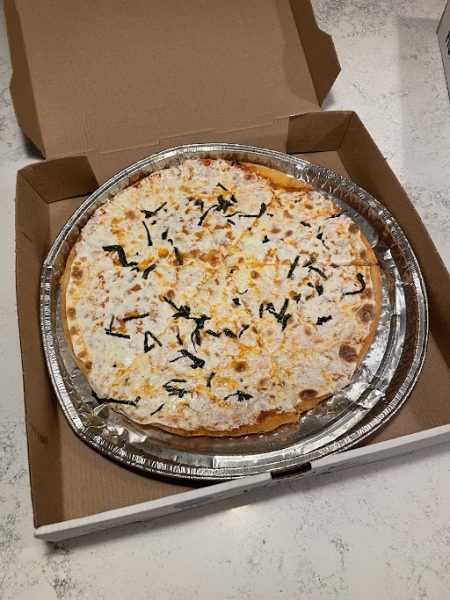A Review on Kendrick Lamar’s ‘Mr. Morale and the Big Steppers’
Wikimedia Commons, under Fair Use
Staff Writer Michael Pizzella discusses his thoughts on Kendrick Lamar’s new album “Mr. Morale and the Big Steppers.”
Following his break into the rap scene in 2003, Kendrick Lamar has produced countless iconic hip-hop records during his time in the industry. From the grainy yet profound “Good Kid M.A.A.D. City” to the awe-inspiring and heavy-hitting “To Pimp A Butterfly,” it’s easy to see why Kendrick Lamar has established himself as one of the greatest rappers of all time.
Kendrick uses his music to talk about his pain and issues as a child and an adult. Whether it’s talking about the death of close friends from gang-related violence or speaking on his mental struggles of making it out of his hometown, Compton. Kendrick grabs everyone’s attention with his elite-level storytelling and exciting persona. Unfortunately, Kendrick decided to step away from music for a couple of years, leaving fans yearning for new music; when “Mr. Morale and The Big Steppers” was announced in early May. The rap community was obsessed with Kendrick once again.
After listening to the album at 12:04 a.m. Friday, May 13, I loved it from the first hearing. The entire album was a theatrical experience, and it seems like every song is intertwined, trying to tell a story; the only problem is that you can’t uncover this story after the first listen. The music itself sounds, unlike anything Kendrick has ever created before.
Songs like “N95” and “Mr. Morale” are some of the most futuristic sounding and complex Kendrick songs I have ever heard.
On the other hand, you have tracks like “United in Grief” or “Mother I Sober” that rely more on classic sounds like the tracks on Kendrick’s previous album “Damn.” This album also offers more practical ways like “Die Hard,” arguably the most unique Kendrick song in his entire discography. Nevertheless, the first listen was a great experience, which prompted me to dive deeper into pieces and uncover the sounds that held the album’s story.
When it comes to the music itself, the songs are heavily reliant on the use of instruments. Most rap songs today rely on electronic sounds generated from a program and not the actual devices themselves. Despite this, Kendrick does a great job of using authentic instruments to create new sounds that he has never experimented with before.
“To Pimp A Butterfly,” the most extensive record in his discography, relied on instruments like the trumpet, bass, drums, and the keyboard to create funk-inspired sounds. However, in his new paper, Kendrick seems to have strayed away from that sound and instead focused on more theatrical instruments. “Mother I Sober” can be seen in one of his most captivating songs as he uses instruments like the piano and organ. Using instruments like the piano proved to be a great choice, as they allowed Kendrick to create a baseline for some of the most heart-wrenching and story-driven songs in his discography.
To put it simply, the production on each track enhances Kendrick’s story-telling and makes his words more impactful while making beautiful sounding tracks that can be both calm and aggressive.
Despite not hearing from him in years, the world finally sees the “real” Kendrick Lamar.
This album is Kendrick’s opportunity to reconnect with his fans, and he does this by telling stories about his mental state, stance on specific issues, and the world from his perspective. With events in his life like the distrust within his family, the tension between him and his cousin, the disdain from his friends stuck in Compton, and the mental instability of his mind, Kendrick does a great job of connecting with his audience, illustrating his obstacles. A perfect example of this comes off the final track, “Mirror,” as he states: “I’m sorry I didn’t save the world, I had to build mine again,” a lyric that has stuck with me even after the third listen of this album. While Kendrick’s idea of using personal experiences in his life to convey specific ideas has been used prior in past albums, he has never attempted to wield it as powerfully as he does now. As a direct result of his effective use of emotions and music, his words have become exponentially more important and well-received by listeners worldwide.
One thing I enjoyed was how different this album was compared to other Kendrick albums. This album dives into Kendrick’s headspace, which is fitting because he has seemingly disappeared from the public eye for years. This album is the most introspective and personal Kendrick has ever created, and it is an excellent reflection of Kendrick as a person. I also enjoyed the experimentation in the sound of this album. Kendrick has always based his production around jazz or funk, but this album heavily relies on piano, an idea that is both respectable and works very well. Overall, the details, catchy-sounding songs, hard-hitting lyrics, and the beautifully orchestrated narrative make for a very pleasurable listening experience that is both exciting and moving.
I know that a song can have great lyrics but sound terrible if not executed correctly. Fortunately, most songs achieve that cohesiveness between the lyrics and the production. Apart from some distant sounds that Kendrick makes in the background of some tracks, and some wordplay that is a little generic for Kendrick as an artist, the lyrics are catchy yet honest, which I can’t say for a lot of his contemporaries.
What separates Kendrick from other artists in hip hop is not his choice of production or witty wordplay but the amount of care and thought he puts into each album, ultimately trying to convey a narrative that says something about Kendrick’s thoughts or feelings.
His hypocrisy, addictions, marital obstacles, and even his fears of being a bad father, like his father was to him. All of these problems and worries are addressed through the narrative of this album, adding to the theatrics of the record and improving the experience.
To uncover the narrative, you need to dissect the individual tracks, sequencing of songs, and the lyrics to best understand the album’s underlying message. An excellent place to start is the separation of the tracklist with two separate discs.
The first disc comprises nine songs that describe Kendrick’s reluctance to get help from a therapist as his wife urges him to get help. For most of the songs on this disc, Kendrick denies the idea of help and continues to rap about problems that he is dealing with, internalizing the trauma he has gone through. However, after the events in the song “We Cry Together”, one of my favorite Kendrick tracks of all time, Kendrick is prompted to get help after arguing with his wife. This acceptance can be seen in the song purple hearts, where Kendrick is “tippy-toeing, and I’m up walking” to therapy; This concludes the first disc.
The next disc begins with a vocalist singing, “we may not know which way to go, down this dark road,” before being interrupted by someone saying, “Mr. Duckworth.” This is an essential detail, as Kendrick’s real last name is Duckworth, meaning someone is calling his name to go somewhere. Furthermore, Kendrick is being called to see his therapist “Echo,” showing he has confided in his wife’s advice and is now seeing therapy.
After this, the song begins, but not before a familiar voice states, “Session 10: Breakthrough.” This could mean many things, but my primary interpretation is that Kendrick has been going to therapy for some time now, but he has finally made strides in his mental health. Additionally, this song is the 10th track on the album, which could also insinuate that each way has been a therapy session. Regardless, these small details tell the story of Kendrick going from neglecting the idea of therapy, to getting help and improving himself, a concept he has never really touched upon in his other albums.
Now that I have discussed the music itself, the lyrics in each song, and the album’s overall narrative, I have created a pretty good idea of what I love about this album.
Yes, there are problems with this album, like the inconsistency with some songs or the lack of care on some tracks compared to the lustrous successes of this album. Still, I genuinely believe Most of Kendrick’s work up until this point has been about his terrible upbringing in Compton and how he has internalized that trauma, but he has never talked about the mental stress this has on his life.
This album is like nothing Kendrick has ever done and should be considered one of the best projects in 2022. Still, this is just my opinion on the album. I think my English teacher in my first year, Mr. Morone, put it perfectly, “This album is like fine wine. You need to uncork it and let it sit for a bit.” I guess we will see how “Mr. Morale and the Big Steppers” is received by fans, but this was a fantastic album from my perspective.
















